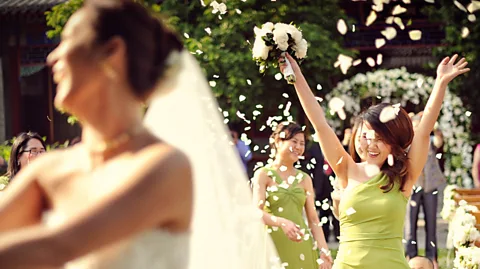sickofyourcrap.com – The blending of cultures in modern society has led to an increase in cross-cultural marriages, particularly between Asian and Western partners. These unions bring together individuals from distinct backgrounds, each with their own traditions, values, and expectations. This article explores the unique experiences and challenges faced by couples in Asian-Western marriages, highlighting the beauty of diversity and the strength required to navigate the complexities of such relationships.
Understanding Cultural Differences
One of the primary aspects of an Asian-Western marriage is the acknowledgment and understanding of cultural differences. This includes language barriers, religious beliefs, and familial expectations. Couples must learn to communicate effectively, respect each other’s heritage, and find a balance between their respective traditions.
Family Dynamics and Expectations
Family plays a significant role in both Asian and Western cultures, but the dynamics and expectations can vary greatly. In many Asian cultures, family is central, with strong emphasis on filial piety and community. Western cultures, on the other hand, often prioritize individualism and personal choice. Couples in Asian-Western marriages must navigate these differing perspectives, ensuring that both partners feel supported and valued.
Navigating Traditions and Celebrations
Holidays and celebrations can be a delightful blend of traditions in Asian-Western marriages. From Lunar New Year to Christmas, couples have the opportunity to experience a rich tapestry of cultural festivities. However, this also requires compromise and planning to honor both sides of the family and their customs.
Challenges in Cross-Cultural Marriages
Despite the joy that comes from embracing different cultures, Asian-Western couples may encounter challenges. Stereotypes and prejudices can impact relationships, both within the couple and from external societal pressures. Additionally, the couple may face misunderstandings or conflicts due to differing communication styles and expectations.
Building a Shared Identity
As the relationship evolves, couples in Asian-Western marriages often find themselves creating a unique identity that honors their diverse backgrounds. This can involve blending traditions, raising children with a bicultural upbringing, and finding common ground that strengthens their bond.
Conclusion
Asian-Western marriages are a testament to the power of love and the human capacity to bridge cultural divides. While these relationships may present unique challenges, they also offer the opportunity for growth, learning, and a deeper appreciation of the world’s rich cultural diversity. Couples who successfully navigate the complexities of their cross-cultural union often find that their differences are not just tolerated but celebrated as a fundamental part of their shared journey.
